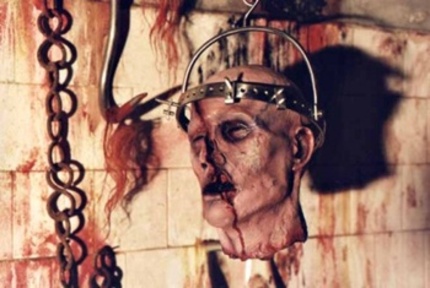Fantasia 2010: TT SYNDROME Director Dejan Zecevic Talks War And Horror.

When one says 'Serbian Horror', the immediate association is
usually not movies, or fiction, but reality. You told me that you wrote
the screenplay for T.T. SYNDROME during the time of the NATO bombing of
Serbia. Is it a pure coincidence that you wrote it at the time of
bombing? Would it have emerged without it just then?
In general, it is probably some kind of coincidence, but on the other
hand, some kind of reason that I wrote it at the time of the bombing
probably exists. Of course, my script has nothing particular to do with
reality and with this kind of real life horror, it is really fiction,
but some kind of the overall atmosphere in those times has probably
encouraged me to deal with this genre at that time. I personally think
that horror is generally a Western invention, it is a genre which is
definitely coming from the West, but I have a feeling that here, in
Serbia, the two genres that are most suited to portray the atmosphere
and something which has to do with us are either absurd black comedy or
horror. And these are the two genres that I have dealt with so far.
And the idea that almost the entire film takes place in the public bath and restroom, where did it originate? Were you aware of this place previously? Were you inspired for this story by it, or did the idea come first?
No, the location was found after the first few versions of the script were made, we have only adapted the latest version of the script to this object. And why this space? I'm always in my thoughts returning to the old, Aristotelian rule, the unity of space, time and action. After all, 80% of the film is in one building, that's always tempting and interesting, so I opted for this approach.
Did you have any conscious intention with the idea of toilets as the location for events? Is this shithole a metaphor for Serbia today?
I am, of course, aware that it can be related to that, but I was not aware of it during the writing, it is obviously something subconscious. It is absolutely clear to me that it can thus be read and will be read, and that it was my intention, but a really subconscious intention, because I was primarily focused on making the story work.
Your scripts which I read mostly tend towards slasher. Do you prefer to watch this sub-genre of horror? Do you have any ambition, perhaps, to shoot, for example, a spooky movie about ghosts, i.e. a film distant from slasher type of horror?
Privately I may not be too fond of the slasher variant; however, I think the horror genre here, in Serbia, does not exist at all. (The interview was conducted in the year 2000; a decade later, the situation is significantly different! - Dejan O.) I think, for the people here who are to deal with this genre in the future, god willing, we simply need to start the cycle. And also, if I wanted later to deal with horror, and I probably would, I just had to try myself in a type of film which I think is the best way for a start. On the other hand, some kind of local version of a surreal horror, with supernatural elements, is a completely unexplored terrain here, at this moment. Knowing the Balkan mentality I think one needs a lot of skill to know how to make such type of a film so that people can accept it. So I chose this type of realistic approach which has elements of surreal, but not too much.
Are you saying that the spooky, fantastic horror is too subtle for Serbian audience?
I didn't mean "too subtle", but after all we are a nation with a strong ironic attitude even towards foreign films with fantasy and the supernatural - let alone towards the domestic. An author who tries to sell some kind of a ghost or spirit to our audience really needs a lot of skill, and probably a lot of money, to make it convincing and frightening enough that our audience can accept it.
Did you have some specific models in terms of film expression and visual look of the film?
In purely dramaturgical terms, perhaps T.T. SYNDROME is based on these great predecessors, Argento, Carpenter, etc. But in the approach, given the sensitivity of our audience to genre material, we had a little "dirtier" approach, somewhat in 'Dogma' - style, with camera in hand, with a completely free camera, to be closer to reality, because the main problem is convincing the audience that this is a realistic film, to grab them and say, "Yes, this is really happening."
How do you, as a filmmaker, perceive the horror genre? It seems to me a particularly visual and cinematic genre, so that many established directors felt the need to try their hands in it.
That's right, that's looking at horror from the professional point of view ... This is because the horror, for me, represents the essence of film expression. So, in terms of handling images, sound, it is one of the most cinematic genres. It is the least based on the text and mostly works through the image, sound, etc. In this sense it is the biggest challenge for a director. I think that a director who makes a good horror has definitely mastered all the problems of filmmaking.







